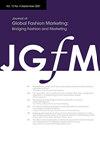Conspicuous value and luxury purchase intention in sharing economy in emerging markets: The moderating role of past sustainable behavior
IF 5.5
Q2 BUSINESS
引用次数: 6
Abstract
ABSTRACT In the last few years, there has been an increase in a tendency towards the sharing economy. The purpose of this study is to identify the role of conspicuous value, attitude towards luxury goods in the sharing economy, subjective norm, and past sustainable behavior in influencing purchase intention for luxury fashion goods in the sharing economy. Extant literature on luxury goods established the relationship between conspicuous value and purchase intention. However, it is still unexplored whether the same relationship will hold in luxury rental consumption or not. Thus, this study fills gaps in the marketing literature by studying the direct, mediating, and moderating relationship among these variables in the context of luxury sharing economy consumption. Data was collected through a questionnaire from two high-end malls in India (N = 232). Data analysis was done using AMOS 25 and the SPSS PROCESS macro. The findings of the study revealed that both attitude and subjective norm mediate the relationship between conspicuous value and purchase intention. Further, past sustainable behavior was found to moderate the relationship between conspicuous value and attitude. However, the subjective norm does not moderate the relationship between attitude and purchase intention.新兴市场共享经济中炫耀性价值与奢侈品购买意愿:过往可持续行为的调节作用
在过去的几年里,共享经济的趋势越来越明显。本研究的目的是确定炫耀性价值、共享经济中对奢侈品的态度、主观规范和过去的可持续行为在影响共享经济中奢侈品时尚产品购买意愿中的作用。现有的奢侈品研究文献建立了炫耀性价值与购买意愿之间的关系。然而,在奢侈品租赁消费中是否也存在同样的关系,目前尚不清楚。因此,本研究通过研究奢侈品共享经济消费背景下这些变量之间的直接、中介和调节关系,填补了市场营销文献的空白。数据通过印度两家高端商场的问卷调查收集(N = 232)。使用AMOS 25和SPSS PROCESS宏进行数据分析。研究发现,态度和主观规范在炫耀性价值与购买意愿的关系中起中介作用。此外,过去的可持续行为对炫耀性价值与态度之间的关系具有调节作用。而主观规范对态度与购买意愿的关系没有调节作用。
本文章由计算机程序翻译,如有差异,请以英文原文为准。
求助全文
约1分钟内获得全文
求助全文
来源期刊

Journal of Global Fashion Marketing
BUSINESS-
CiteScore
6.90
自引率
31.60%
发文量
34
期刊介绍:
The Journal of Global Fashion Marketing is a quarterly journal that publishes peer-reviewed conceptual and empirical papers and business cases of original works that significantly contribute to the overall advancement of marketing theory, research, and practice in fashion, design, and culture. JGFM endeavors to be a “global bridge” connecting marketing scholars and practitioners in fashion, design, and culture throughout the world. We publish high-quality scholarly articles on marketing written by contributors representing the leading academic authors. As we state on the cover of every issue, our positioning statement, our value added to the marketing scholar readership, is truly to “Bridge Fashion and Marketing” 1. Monitor and analyze global fashion marketing trends. 2. Generate and integrate new ideas and theories related to fashion, luxury, and culture marketing theory and practice. 3. Apply new research methods and techniques in fashion, luxury, and culture marketing. 4. Explore and disseminate cutting edge fashion marketing practices. JGFM welcomes manuscripts that provide fresh, innovative insight to any topic in the field of fashion, luxury, and culture marketing. Both conceptual and empirical works are valued, so long as the manuscript addresses substantive issues in marketing.
 求助内容:
求助内容: 应助结果提醒方式:
应助结果提醒方式:


